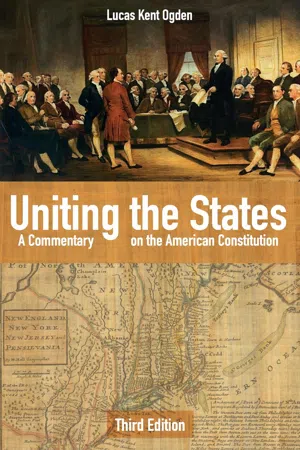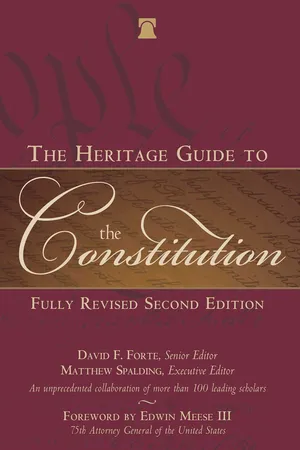Politics & International Relations
3rd Amendment
The 3rd Amendment is a part of the United States Constitution that prohibits the government from forcing citizens to quarter soldiers in their homes during peacetime without their consent. This amendment was added to protect citizens from being forced to house and feed soldiers against their will, as was common practice during the American Revolution.
Written by Perlego with AI-assistance
Related key terms
1 of 5
3 Key excerpts on "3rd Amendment"
- eBook - ePub
Uniting the States
A Commentary on the American Constitution: Third Edition
- Lucas Kent Ogden(Author)
- 2015(Publication Date)
- Books on Demand(Publisher)
It protects people’s right to their own property by prohibiting the military to force any citizen to house soldiers. There may be exceptions “in time of war,” but only if Congress specifically makes a law defining the conditions (which it has not done). This amendment was particularly important at the time because the British had demanded American colonists to house their soldiers. Many Americans wanted to ensure that their government would never be able to do this. Beyond this situation, the Third Amendment also implies a general right to privacy and private property protected from the government and military. This general concern is dealt with further in the Fourth Amendment. Echoing the Second Amendment, it again mentions security as well as a “right of the people.” They have a right “to be secure in their persons, houses, papers and effects, against unreasonable searches and seizures.” Government officials cannot simply search people or take anything from them (“effects” signify any personal items of property) without first justifying these actions as “reasonable.” Ultimately, the courts decide whether specific “searches and seizures” are “unreasonable” or not. In order to search someone’s home, the authorities need a warrant, a court order allowing them to do so. This forces the police to first convince a judge that they have good reason to believe (“probable cause”) that someone has committed a particular crime - eBook - ePub
The Heritage Guide to the Constitution
Fully Revised Second Edition
- David F. Forte, Matthew Spalding, David F. Forte, Matthew Spalding(Authors)
- 2014(Publication Date)
- Regnery(Publisher)
The Anti-Federalists used the absence of a ban on quartering as an argument against ratification. Once the concept of a Bill of Rights was agreed upon, however, there was little controversy over the inclusion of a ban on quartering. Six of the original thirteen states also adopted constitutional provisions banning the quartering of soldiers.The British practice of quartering soldiers in America grew out of the lack of regular army bases, unclear legislative authority for British army quartering in America, and the need to move large bodies of troops about the country during conflicts with the French and Indians. Although there were numerous conflicts over quartering in both Britain and America before the 1770s, the most significant episodes concerned the British quartering of soldiers in private homes to punish the people of Boston under the Intolerable Acts of 1774.Because of its clear text, there have been few court opinions discussing the Third Amendment. Recently, the Supreme Court declared that the Amendment has not been “fully incorporated” by the Due Process Clause of the Fourteenth Amendment and therefore, by implication, it is not applicable to the states, McDonald v. City of Chicago (2010). The Court ignored an earlier federal circuit court opinion that had found the Amendment was indeed incorporated. Engblom v. Carey (1982). In Engblom, the federal circuit court also determined that residences of all types would be subject to Third Amendment protection. The case had arisen when New York State correctional officers on strike were evicted from their state-provided residences, which were then provided to National Guardsman. Upon remand, the district court dismissed the state correctional officers’ suit without reaching the substance of the Third Amendment claim.Other courts have not been receptive to Third Amendment claims. One federal court dismissed as bordering on the “frivolous” the assertion that federal approval of military flights through the airspace over one’s home violated the Amendment. Custer County Action Ass’n v. Garvey - No longer available |Learn more
- David L Hudson(Author)
- 2010(Publication Date)
- Visible Ink Press(Publisher)
pre-existing right. The very text of the Second Amendment implicitly recognizes the pre-existence of the right and declares only that it ‘shall not be infringed.’”Justice John Paul Stevens (dissenting): “The Second Amendment was adopted to protect the right of the people of each of the several States to maintain a well-regulated militia. It was a response to concerns raised during the ratification of the Constitution that the power of Congress to disarm the state militias and create a national standing army posed an intolerable threat to the sovereignty of the several States. Neither the text of the Amendment nor the arguments advanced by its proponents evidenced the slightest interest in limiting any legislature’s authority to regulate private civilian uses of firearms. Specifically, there is no indication that the Framers of the Amendment intended to enshrine the common-law right of self-defense in the Constitution.”Which interpretation—collective or individual—has the U.S. Supreme Court adopted?
The U.S. Supreme Court interpreted the individual-rights model of interpreting the Second Amendment in District of Columbia v. Heller (2008). The Court ruled 5 to 4 that the prefatory clause about a “well-regulated militia” does not limit the operative clause that talks about “the right of the people.”What happened in the Heller case?
In District of Columbia v. Heller (2008) the U.S. Supreme Court struck down a District of Columbia law that forbade the private possession of handguns. Dick Heller, a D.C. special police officer who carried a gun in his work protecting the Federal Judicial Center, contended that he also should have a constitutional right to keep a handgun in his home for self-defense and home protection.THIRD AND FOURTH AMENDMENTS
What was the purpose of the Third Amendment?
The Third Amendment arose out of the special conditions of the Revolutionary-War era when the government sometimes sought to require colonists to house British troops in their private homes. The amendment does not have much practical usage today, as the military has its own bases and quarters.
Index pages curate the most relevant extracts from our library of academic textbooks. They’ve been created using an in-house natural language model (NLM), each adding context and meaning to key research topics.


